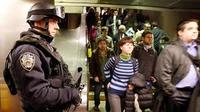-
Denver holds Operation Mountain Guardian drill
The city of Denver, Colorado plays host to a massive terror-attack simulation involving over 100 emergency services organizations; the largest drill of its kind in the region is intended to ‘stress-test” the planning and resources of local first responders
-
-
Why the Twin Towers collapsed: new theory
Materials scientist says that a mixture of water from sprinkler systems and molten aluminum from melted aircraft hulls created explosions that led to the collapse of the Twin Towers on 9/11
-
-
Challenging conventional wisdom on border security
Two new papers say that if the United States is serious about border security, then instead of building bigger walls or throwing more resources at empty enforcement efforts, the United States should adopt strategies that address real threats to U.S. border security — drug cartels
-
-
Saving victims trapped under concrete
New tool allow first responders to reach those trapped beneath concrete more quickly; the tool generates a high-energy jolt to create a contained hole in the concrete; a series of these holes allows the creation of an area large enough to deliver vital supplies such as food, water, and medicine to victims before first responders are able to get victims to safety.
-
-
Maintaining water quality
Scientists at Kansas State University and seven other collaborating institutions were recently awarded $3.3 million from the National Science Foundation (NSF) to conduct a-large scale study of how stream organisms influence water quality across North America
-
-
Sector Report for Tuesday, 20 September 2011: Law Enforcement Technology
This report contains the following stories.
Plus 1 additional story.
-
-
Can citizens legally -- and secretly -- record police officers in action?
Technological advances have raised questions concerning the constitutionality of new police methods (for example, attaching a GPS device to a suspect car without the police first obtaining a warrant to do so); there are legal issues on the other side of the equation — that is, whether or not citizens are constitutionally protected when doing video or audio recording of police officers in action
-
-
New vest offers GPS tacking and other information
Canadian company Laipac Technology is showing its S911 GPS Vest which the company describes as “a high coverage assault protection designed for military, tactical law enforcement and VIP personnel that demand the highest protection.”
-
-
Detroit police disarm IED found in restaurant
On Sunday, an improvised explosive device was found in the restroom of a Detroit restaurant; police confirmed that it was a bomb and successfully disarmed it
-
-
Expert questions DHS grants for rural communities following 9/11

In the decade since 9/11, the U.S. government has poured more than $1.3 million into the rural community of Ross County, Ohio, which some argue is a waste of federal resources; the funds were ostensibly designed to prevent terrorism, but much of the money has been spent to bolster emergency response capabilities in the event of a major disaster whether it be natural or manmade
-
-
Researchers show facial-reading lie-detector

New lie detecting system records subtle clues that people give off when lying, such as increased blood flow around the eyes, tiny lip movements, or nose twitching; one of the major selling points of such technology would be its use in situations where the person being targeted does not know they are being tested
-
-
NYPD remains on high-alert following 9/11

Officials in New York remain on high-alert following the warning issued by DHS that terrorists might be plotting an attack on the city for the ten-year anniversary of 9/11; NYPD have pulled back the additional security measures put in place for the ten-year anniversary like checkpoints at ports of entry and bridges, but remain on vigilant for a potential bomb attack
-
-
Texas drought forces military to change training

A particularly severe drought in Texas has forced the military to change the way it trains its soldiers due to the risk of starting fires; law enforcement agencies would benefit from taking note of additional safety measures put into place
-
-
Supreme Court to rule on age of "Big Brother" surveillance

This November the Supreme Court is gearing up to hear a landmark case which will decide how far law enforcement agencies can pry into an individual’s private life; federal judges argue that the use of GPS surveillance by law enforcement is an “Orwellian intrusion” into private life and violate the Fourth Amendment; meanwhile police say GPS tracking is simply a more efficient way to tail a suspect’s car or track their movements, things they can currently do without a warrant
-
-
$1.1 million order for Implant Sciences' portable explosives detectors
Implant Sciences Corporation, a developer of explosives detection technology, recently announced that it had received a $1.1 million order for its portable explosives detection systems; with the latest purchase, Implant Sciences will supply its Quantum Sniffer QS H-150 portable devices to the Middle East for use by critical infrastructure operators
-
More headlines
The long view
Tantalizing Method to Study Cyberdeterrence
Tantalus is unlike most war games because it is experimental instead of experiential — the immersive game differs by overlapping scientific rigor and quantitative assessment methods with the experimental sciences, and experimental war gaming provides insightful data for real-world cyberattacks.
Using Drone Swarms to Fight Forest Fires
Forest fires are becoming increasingly catastrophic across the world, accelerated by climate change. Researchers are using multiple swarms of drones to tackle natural disasters like forest fires.
Testing Cutting-Edge Counter-Drone Technology
Drones have many positive applications, bad actors can use them for nefarious purposes. Two recent field demonstrations brought government, academia, and industry together to evaluate innovative counter-unmanned aircraft systems.
European Arms Imports Nearly Double, U.S. and French Exports Rise, and Russian Exports Fall Sharply
States in Europe almost doubled their imports of major arms (+94 per cent) between 2014–18 and 2019–23. The United States increased its arms exports by 17 per cent between 2014–18 and 2019–23, while Russia’s arms exports halved. Russia was for the first time the third largest arms exporter, falling just behind France.
How Climate Change Will Affect Conflict and U.S. Military Operations
“People talk about climate change as a threat multiplier,” said Karen Sudkamp, an associate director of the Infrastructure, Immigration, and Security Operations Program within the RAND Homeland Security Research Division. “But at what point do we need to start talking about the threat multiplier actually becoming a significant threat all its own?”
The Tech Apocalypse Panic is Driven by AI Boosters, Military Tacticians, and Movies
From popular films like a War Games or The Terminator to a U.S. State Department-commissioned report on the security risk of weaponized AI, there has been a tremendous amount of hand wringing and nervousness about how so-called artificial intelligence might end up destroying the world. There is one easy way to avoid a lot of this and prevent a self-inflicted doomsday: don’t give computers the capability to launch devastating weapons.
